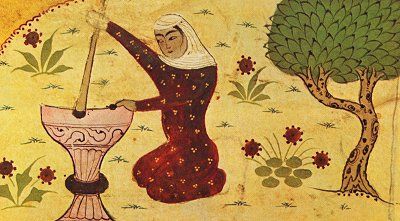Fat provides more than double the calories of protein and carbohydrate; one gram of fat provides nine calories, whereas proteins and carbohydrates have four calories. Department of Health recommends that 33 per cent of our total calories should come from fat. Because you cannot avoid to consume saturated fats they should account for no more than 10 per cent of our total energy (calories): the rest of the fat calories should come from monounsaturated or polyunsaturated fats, because these are more beneficial to health. If you are eating 2,000 calories a day, 33% of fat amounts to 73 grams of total fat daily. If your daily calorie intake is 1,500 calories, 33% of fat amounts to 55 grams of total fat daily.
Although there are numerous names for different types of fats, they fall into two groups: saturated and unsaturated.
--Saturated fat is generally solid at room temperature, is usually from animal sources and found mainly in lard, butter, margarine, cheese and whole milk. It's also the white fat you see on red meat. The less saturated fat you eat, the better. Eating saturated fats has been linked to coronary heart disease.
Hydrogenated fat is made by taking an oil and pumping hydrogen into it to make it hard. Manufacturers use this primarily because it's cheap and better shelving life. The intakes of trans fatty acids have been associated with raised blood cholesterol levels, one of the risk factors associated with developing heart disease. All we can do is look for the words partially hydrogenated vegetable oil and if we see these words simply avoid the product. Many food manufacturers are now replacing these hydrogenated fats with fats that are less harmful to our body, but still not great. Some of these are Palm Oil and Coconut Oil. Also watch for these fats in fast food places and restaurants.
--Unsaturated fats are usually liquid at room temperature and generally come from vegetable sources. Mono unsaturated and poly unsaturated fats are both included in this group.
Unsaturated fats are healthier and can be found in cold pressed vegetable oils such as olive, hemp, rapeseed, peanut, sesame, sunflower, canola and soy oils. Also are found in coldwater fish: sardines, salmon, and albacore tuna and Small fish like mackerel, sardines, pilchards and fish oils. They are also rich sources of omega 3 fatty acids, with flaxseed oil being the best. All kinds of Nuts and seeds; Walnuts, Almonds, pistatues, sunflower seeds. Half an avocado every other day, olives are very healthy fat foods to eat.
You can, of course, also get polyunsaturated soft margarines, like Smart Balance. Watch the labels of these products they often contain partially hydrogenated fat - the fat we need to be most wary of and on the package they say no Tran Fat.
RELATED/HELPFUL ARTICLES
Subscribe to:
Post Comments (Atom)
ABC signs of a healthy person!
When my parents used to go to the Doctor; the doctor would look at them and take their heart beat from their pulse, and he knew what was wrong with them. I think the doctor mostly would deduce his findings from their physical presence. The following are some of the attributes of a healthy person. You can find the reasons and cures for all these items in this blog now or in the future.
- Eyes should be shiny and the whites should be white.
- Hair should be shiny.
- Nails should be without white spots, smooth and strong.
- When openning and closing the mouth one should not hear a click.
- When you get up in the morning, your body should be rested and not in pain.
- You should not get up with a headache.
- You should not be tired all the time.
- You should be able to sleep very well at night.
- You have to eliminate at least once a day(some say three times!!).The eliminations have to stay on top of the water, not to sink in the bottom. It should be thick and not cut up in very small pieces.
- The color of your urine should be light, clear and not cloudy. (If you have certain foods or vitamins, the strong urine color is normal when you eat these foods)
- The color of your tongue should be a nice flesh color red.
- You should not have dark colors under your eyes.
- You should not get irritated very easily.
BMI Calculator
BMI stands for Body Mass Index. It measures the ratio of one's body weight to their height. It also tries to give an idea of the amount of body fat a person has. Two people can have the same BMI but different levels of body fat(because Muscle weighs more than fat). A high percentage of body fat increases the chances of heart disease, Type II diabetes, and cancers.
*******************************************




No comments:
Post a Comment